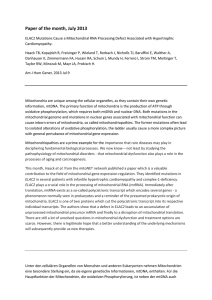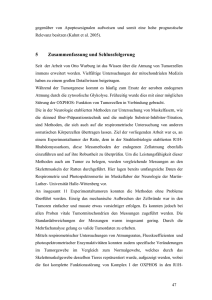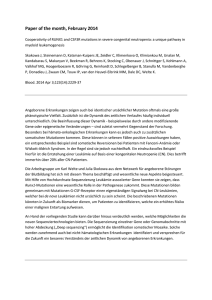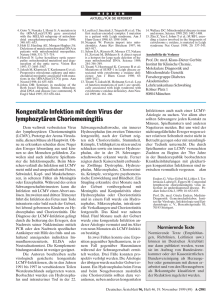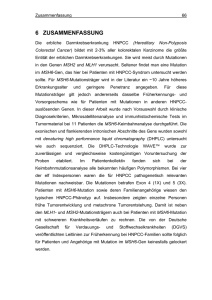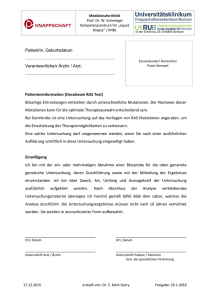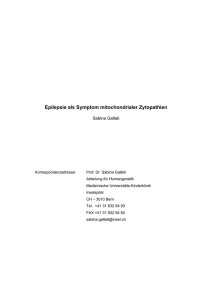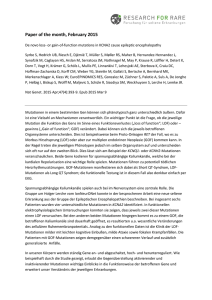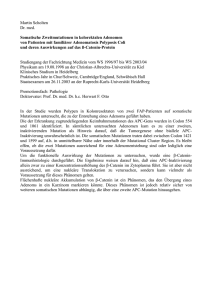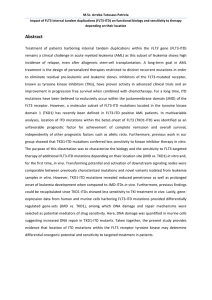Paper of the month, December 2014
Werbung
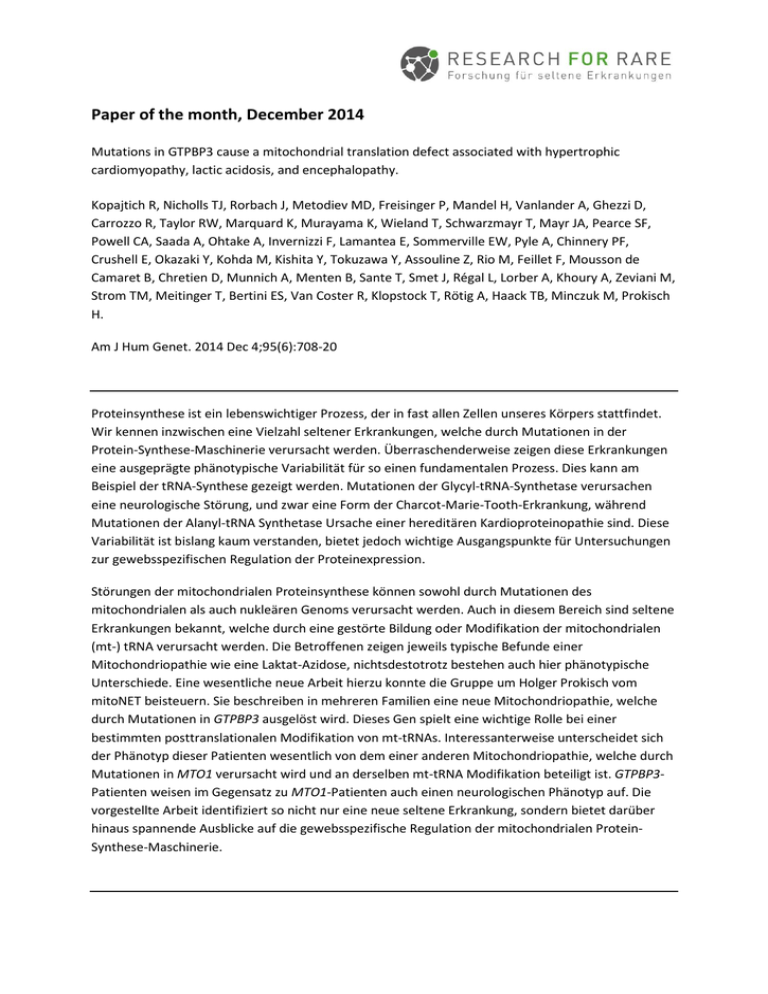
Paper of the month, December 2014 Mutations in GTPBP3 cause a mitochondrial translation defect associated with hypertrophic cardiomyopathy, lactic acidosis, and encephalopathy. Kopajtich R, Nicholls TJ, Rorbach J, Metodiev MD, Freisinger P, Mandel H, Vanlander A, Ghezzi D, Carrozzo R, Taylor RW, Marquard K, Murayama K, Wieland T, Schwarzmayr T, Mayr JA, Pearce SF, Powell CA, Saada A, Ohtake A, Invernizzi F, Lamantea E, Sommerville EW, Pyle A, Chinnery PF, Crushell E, Okazaki Y, Kohda M, Kishita Y, Tokuzawa Y, Assouline Z, Rio M, Feillet F, Mousson de Camaret B, Chretien D, Munnich A, Menten B, Sante T, Smet J, Régal L, Lorber A, Khoury A, Zeviani M, Strom TM, Meitinger T, Bertini ES, Van Coster R, Klopstock T, Rötig A, Haack TB, Minczuk M, Prokisch H. Am J Hum Genet. 2014 Dec 4;95(6):708-20 Proteinsynthese ist ein lebenswichtiger Prozess, der in fast allen Zellen unseres Körpers stattfindet. Wir kennen inzwischen eine Vielzahl seltener Erkrankungen, welche durch Mutationen in der Protein-Synthese-Maschinerie verursacht werden. Überraschenderweise zeigen diese Erkrankungen eine ausgeprägte phänotypische Variabilität für so einen fundamentalen Prozess. Dies kann am Beispiel der tRNA-Synthese gezeigt werden. Mutationen der Glycyl-tRNA-Synthetase verursachen eine neurologische Störung, und zwar eine Form der Charcot-Marie-Tooth-Erkrankung, während Mutationen der Alanyl-tRNA Synthetase Ursache einer hereditären Kardioproteinopathie sind. Diese Variabilität ist bislang kaum verstanden, bietet jedoch wichtige Ausgangspunkte für Untersuchungen zur gewebsspezifischen Regulation der Proteinexpression. Störungen der mitochondrialen Proteinsynthese können sowohl durch Mutationen des mitochondrialen als auch nukleären Genoms verursacht werden. Auch in diesem Bereich sind seltene Erkrankungen bekannt, welche durch eine gestörte Bildung oder Modifikation der mitochondrialen (mt-) tRNA verursacht werden. Die Betroffenen zeigen jeweils typische Befunde einer Mitochondriopathie wie eine Laktat-Azidose, nichtsdestotrotz bestehen auch hier phänotypische Unterschiede. Eine wesentliche neue Arbeit hierzu konnte die Gruppe um Holger Prokisch vom mitoNET beisteuern. Sie beschreiben in mehreren Familien eine neue Mitochondriopathie, welche durch Mutationen in GTPBP3 ausgelöst wird. Dieses Gen spielt eine wichtige Rolle bei einer bestimmten posttranslationalen Modifikation von mt-tRNAs. Interessanterweise unterscheidet sich der Phänotyp dieser Patienten wesentlich von dem einer anderen Mitochondriopathie, welche durch Mutationen in MTO1 verursacht wird und an derselben mt-tRNA Modifikation beteiligt ist. GTPBP3Patienten weisen im Gegensatz zu MTO1-Patienten auch einen neurologischen Phänotyp auf. Die vorgestellte Arbeit identifiziert so nicht nur eine neue seltene Erkrankung, sondern bietet darüber hinaus spannende Ausblicke auf die gewebsspezifische Regulation der mitochondrialen ProteinSynthese-Maschinerie. Protein synthesis is a vital process that takes place in almost all cells of our body. We now know of a number of rare diseases that are caused by mutations in the protein synthesis machinery. Surprisingly, these diseases show a marked phenotypic variability for such a fundamental process. This can be shown using the example of tRNA synthesis amd modification. Mutations of glycyl-tRNA synthetase cause a neurological disorder, a form of Charcot-Marie-Tooth disease, whereas mutations of alanyl-tRNA synthetase lead to hereditary cardioproteinopathy. This variability is still poorly understood, however, it provides important hints and starting points for the study of tissue-specific regulation of protein expression. Disorders of mitochondrial protein synthesis can be caused both by mutations of the mitochondrial and the nuclear genome. This includes rare diseases linked to defective formation or modification of mitochondrial (mt-) tRNA. These patients show typical findings of a mitochondrial disorder such as a lactic acidosis. However, there can also be distinct phenotypic differences between diseases in which the same molecular pathway is affected. The group around Holger Prokisch from the mitoNET made an important contribution to this field. In a recent paper, they describe several families in a new mitochondrial disease, caused by mutations in a gene called GTPBP3. This gene plays an important role in a specific post-translational modification of mt-tRNAs. Interestingly, the phenotype of these patients differs significantly from that of another mitochondriopathy, which is caused by mutations in MTO1 and is involved in the exactly same mt-tRNA modification. In contrast to MTO1 patients, GTPBP3 patients also show a neurological phenotype. In summary, the work presented here not only identified a new rare disease, but also offers exciting insights into tissue-specific regulation of mitochondrial protein synthesis. Comment by Dr. Tilmann Schober, Dr. von Hauner Children’s Hospital, Ludwig Maximilians University Munich [email protected]
